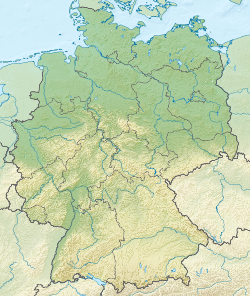The Zwethau Formation is a geologic formation in Germany. It preserves fossils dating back to the Cambrian period.[1]
| Zwethau Formation | |
|---|---|
| Stratigraphic range: Cambrian Stage 3 (Atdabanian) | |
| Type | Formation |
| Unit of | Falkenberg Group |
| Sub-units | Upper & Lower Torgau members |
| Lithology | |
| Primary | Limestone |
| Location | |
| Coordinates | 51°36′N 13°36′E / 51.6°N 13.6°E |
| Approximate paleocoordinates | 38°06′S 106°36′E / 38.1°S 106.6°E |
| Region | Brandenburg |
| Country | |
Fossil content
editThe following fossils have been reported from the formation:[1]
- Afiacyathus paracompositus[2]
- Coscinocyathus germanicus[2]
- Dictyocyathus stipatus[2]
- Erismacoscinus tainius[2]
- Erismacoscinus aff. primus[2]
- Protopharetra dissuta[2]
- P. gemmata[2]
- Proaulopora cf. glabra[2]
- Afiacyathus sp.[2]
- Botomaella sp.[2]
- Coscinocyathus sp.[2]
- Epiphyton sp.[2]
- Erismacoscinus sp.[2]
- Kordephyton sp.[2]
- Renalcis sp.[2]
- Diplostraca indet.[2]
- Hyolitha indet.[2]
- Trilobita indet.[2]
See also
editReferences
editBibliography
edit- Elicki, O (1999), "Palaeoecological significance of calcimicrobial communities during ramp evolution: an example from the Lower Cambrian of Germany", Facies, 41 (1): 27–40, Bibcode:1999Faci...41...27E, doi:10.1007/BF02537458

